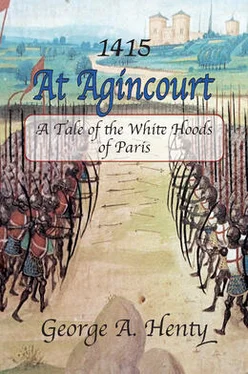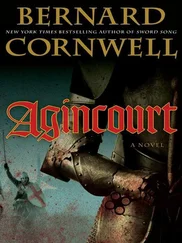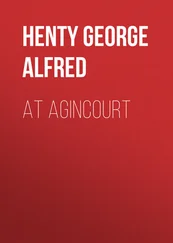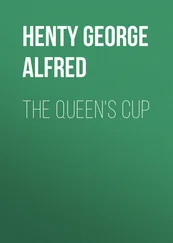“Laggard!” one exclaimed, “what excuse have you to make for coming so late? I noted not that De Jouvaux's wine had mounted into your head last night, and surely the duke cannot have had need of your valuable services this morning?”
“Neither one nor the other befell, D'Estelle. But first let me introduce to you all my friend Guy Aylmer, an English gentleman, the son of a knight of that country, and himself an esquire of Sir Eustace de Villeroy. I am sure you will welcome him when I tell you that he saved my life last night when attacked by a band of cut-throats. Guy, these are my friends Count Pierre d'Estelle, Count Walter de Vesoul, the Sieur John de Perron, and the Knights Louis de Lactre, Sir Reginald Poupart, Sir James Regnier, Sir Thomas d'Autre, and Sir Philip de Noisies.”
“I can assure you of our friendship,” the first-named of these gentlemen said cordially to Guy, “for indeed you have rendered us all a service in thus saving to us our friend D'Estournel. Tell us how the matter occurred, Charles; in sooth, we shall have to take these ruffians of Paris in hand. So long as they cut each other's throats no great harm is done, but if they take to cutting ours it is time to give them a lesson.”
“The matter was simple enough,” D'Estournel said. “As you know, it was late before we broke up at De Jouvaux's last night, for I heard it strike half-past ten by the bell of St. Germain as I sallied out. I was making my way home like a peaceful citizen, when two men came out from a narrow lane and stumbled roughly across me. Deeming that they were drunk, I struck one a buffet on the side of his head and stretched him in the gutter.”
“That was not like a peaceful citizen, Charles,” one of the others broke in.
“Well, hardly, perhaps; but I forgot my character at the moment. However, an instant later there was a shout, and a dozen or so armed men poured out from the lane and fell upon me. I saw at once that I had been taken in a trap. Luckily there was a deep doorway close by, so I sprang into it, and, drawing my sword, put myself in a posture of defence before they were upon me. I ran the first through the body, and that seemed to teach the others some caution. Fortunately the doorway was so deep that only two could assail me at once, and I held my ground for some time pretty fairly, only receiving a few scratches. Presently I saw another opening, and, parrying a thrust, I ran my sword through the fellow's throat. He fell with a loud outcry, which was fortunate, for it came to the ears of my friend here, and brought him and a stout retainer—a prodigiously tall fellow, with a staff longer than himself—to my aid. They were but just in time, for the ruffians, furious at the fall of another of their companions, were pressing me hotly, and slashing so furiously with their swords that it was as much as I could do to parry them, and had no time to thrust back in reply. My friend here ran two of them through, his tall companion levelled six to the ground with his staff, while I did what I could to aid them, and at last the four that remained still on their legs ran off. I believe they thought that the man with the staff was the Evil One himself, who had got tired of aiding them in their villainous enterprises.”
“It was a narrow escape indeed, Charles,” Count Walter de Vesoul said gravely, “and it was well for you that there was that doorway hard by, or your brave friend would have found but your body when he came along. It is evident, gentlemen, that when we indulge in drinking parties we must go home in couples. Of course, Charles, you must lay a complaint before the duke, and he must let the Parisians know that if they do not keep their cut-throats within bounds we will take to sallying out at night in parties and will cut down every man we find about the streets.”
“I will lay my complaint, but I doubt if much good will come of it. The duke will speak to the provost of the butchers, and nothing will be done.”
“Then we will take them in hand,” the other said angrily. “If the Parisians won't keep order in their streets we will keep it for them. Such doings are intolerable, and we will make up parties to scour the streets at night. Men passing peaceably along we shall not of course molest, but any parties of armed men we find about we will cut down without hesitation.”
“I shall be heartily glad to join one of the parties whenever you are disposed, De Vesoul,” D'Estournel said. “Perchance I may light on one or more of the four fellows who got away last night. Now I am ready to have a bout with swords.”
“We have all had our turn, Charles,” the other said.
“Then I must work with the mace,” the count said. “My friend here, you see, did not come off as scatheless last night as I did, or else I would have asked him to have a bout with me. He held his own so well against two of them who fell on him together that I doubt not I should find him a sturdy adversary.”
“I fear not, Count,” Guy said smiling. “I can use my sword, it is true, in English fashion, but I know little of feints and tricks with the sword such as I am told are taught in your schools.”
“A little practice here will amend that,” D'Estournel said. “These things are well enough in a salle d'armes , and are useful when one man is opposed to another in a duel, but in a battle or melee I fancy that they are of but little use, though indeed I have never yet had the chance of trying. We will introduce you to the master, and I hope that you will come here regularly; it will give real pleasure to all. This salon is kept up by the duke for our benefit, and as you are one of his most pressingly invited guests you are certainly free of it.”
They went up in a body to the master. “Maitre Baudin,” Count Charles said, “I have to introduce to you a gentleman who is our mutual friend, and who last night saved my life in a street brawl. He is at present an esquire of Sir Eustace de Villeroy, and has travelled hither with the knight's dame, who has come at the invitation of the duke. His father is an English knight, and as the friend of us all we trust that you will put him upon the list of your pupils.”
“I shall be pleased to do so, Count Charles, the more so since he has done you such service.”
“I am afraid that you will, find me a very backward pupil,” Guy said. “I have been well taught in English fashion, but as you know, maitre, we were more famed for downright hard hitting than for subtlety and skill in arms.”
“Downright hard hitting is not to be despised,” the master said, “and in a battle it is the chief thing of all; yet science is not to be regarded as useless, since it not only makes sword-play a noble pastime, but in a single combat it enables one who is physically weak to hold his own against a far stronger antagonist.”
“That I feel greatly, maitre. I shall be glad indeed of lessons in the art, and as soon as my shoulder is healed I shall take great pleasure in attending your school regularly, whenever my lady has no need of my presence. I am now in the position of the weak antagonist you speak of, and am therefore the more anxious to acquire the skill that will enable me to take my part in a conflict with full-grown men.”
“You showed last night that you could do that,” Count Charles said with a smile.
“Nay, men of that sort do not count,” Guy said. “They are but rough swordsmen, and it was only their number that rendered them dangerous. There is little credit in holding one's own against ruffians of that kind.”
“Well, I will be lazy this morning,” the young count said, “and do without my practice. Will you all come round to my rooms, gentlemen, and drink a glass or two of wine and make the better acquaintance of my friend? He is bound to be back at his lodgings by one, and therefore you need not be afraid that I am leading you into a carouse.”
Читать дальше












